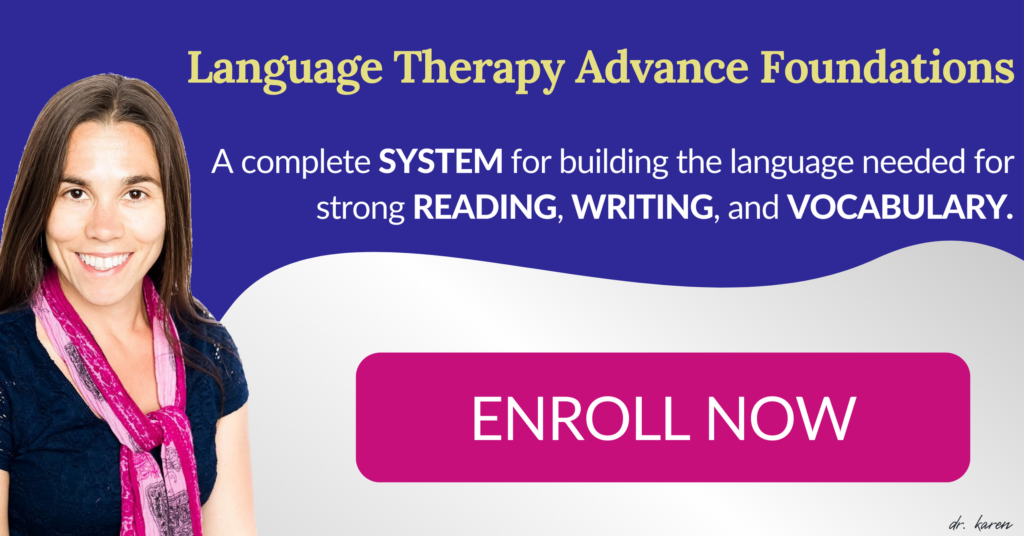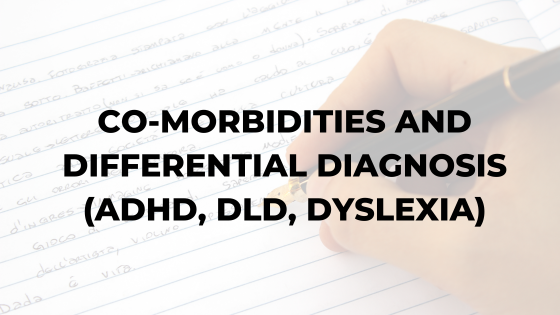I wanted to share this episode from the De Facto Leader’s podcast to make it accessible on the blog since this is such as common question for my readers and listeners.
When kids need support with language, reading/writing, and executive functioning, they often have multiple diagnoses.
This makes both treatment planning, diagnosis, and determining eligibility for educational programming complicated; especially when it comes to legal guidelines as well as state and local policies.
That’s why in episode 159 of De Facto Leaders, I’m sharing a Q & A session I did about comorbidities in my Language Therapy Advance Foundations member’s group.
In this episode I talk about the simple view of reading and how it aligns with the essential 5 framework.
I also talk about common comorbidities, including:
✅Developmental language disorder + dyslexia
✅ADHD + dyslexia
✅Dyslexia + ADHD
I wrap up by discussing clarification from the Office of Special Education and Rehabilitative Services on the use of terms like “dyslexia” and “developmental language disorder” and the difference between schools being PERMITTED to use a term vs. being REQUIRED to provide services aligned with FAPE.
You can listen to the entire episode here:
In this episode I mention Language Therapy Advance Foundations, my program that helps SLPs create a system for language therapy. You can learn more about Language Therapy Advance Foundations here.
The following are evaluation tools that can help guide you in evaluating and treating individuals with ADHD, dyslexia, DLD, and other diagnoses that impact reading, writing, language, and executive functioning.
I cover a complete framework for executive functioning intervention in the School of Clinical Leadership, my program for related service providers who want to emerge as the executive functioning lead on their school teams. You can learn more about that program here.
Keep in mind when you view this list that formal evaluation tools should be used in conjunction with other non-standardized tools. It’s best practice to utilize a portfolio process when doing an evaluation which can consist of a combination of observations, stakeholder interviews, work samples, data from non-standardized protocols, and formal assessments.
Phonological Processing
Comprehensive Test of Phonological Processing-Second Edition (CTOPP-2)
Phonological Awareness Test-2 (PAT-2)
Language/Cognition
Test of Integrated Language and Literacy Skills (TILLS)
Language Processing Test-3rd Edition (LPT-3)
The Listening Comprehension Test-2nd Edition (LCT-2)
Listening Comprehension Test-Adolescent
Test of Language Development-Primary-5th Edition (TOLD-P5)
Test of Language Development-Intermediate-5th Edition (TOLD-I5)
Comprehensive Assessment of Spoken Language-2nd Edition (CASL-2)
Clinical Evaluation of Language Fundamentals-5th Edition (CELF-5)
Wechsler Intelligence Scale for Children-5th Edition (WISC-5)
Academic Performance (Reading/Writing)
Weschler Individual Achievement Test-4th Edition (WIAT-4)
Kaufman Test of Educational Achievement-3rd Edition (KTEA-3)
Gray Oral Reading Tests-5th Edition (GORT-5)
Test of Written Language-3rd Edition (TOWL-3)
Test of Early Written Language-3rd Edition (TEWL-3)
Test of Written Spelling–5th Edition (TWS-5)
Test of Word Reading Efficiency-2nd Edition (TOWRE-2)
Executive Functioning/Social Skills
Delis-Kaplan Executive Functioning System
Test of Problem Solving-3 Elementary
Test of Problem Solving-2 Adolescent
Listening Comprehension Test-2
Listening Comprehension Test-Adolescent
Devereux Student Strengths Assessment
Behavior Rating Inventory of Executive Functions
Behavior Assessment System for Children-3
Executive Functions Test-Elementary
Clinical Evaluation of Language Fundamental-5 Metalinguistics
Clinical Assessment of Pragmatics
IMPACT Social Communication Rating Scale
Revised Concise Symbolic Play Scale
References for this episode:
Caska, H. (2019). Dyslexia 101: Breaking down the “D” word. Presentation conducted by ContinuED.
Caska, H. (2019). Assessing and treating dyslexia: What SLPs need to know. Presentation conducted by ContinueED.
DuPaul, G. J., Gormley, M. J., & Laracy, S. D. (2013) Comorbidity of LD and ADHD: Implications of DMS-5 for assessment and treatment. Journal of Learning Disabilities, 46, 43-51. doi: 10.1177/0022219412464351.
Mendez-Freije, I., Areces, D., & Rodriguez, C. (2024). Language skills in children with attention deficit hyperactivity disorder and developmental language disorder: A systematic review. Children, https://doi.org/10.3390/children11010014
Mueller, K. L., & Tomblin, J. B. (2012). Examining the comorbidity of language disorders and ADHD. Topics in Language Disorders, 32, 228-246. doi: 10.1097/TLD.0b013e318262010d
Snowling, M. J., Hayiou-Thomas, M. E., Nash, H. M., & Hulme, C. (2020). Dyslexia and developmental language disorder: Comorbid disorders with distinct effects on reading and comprehension. Journal of Child Psychology and Psychiatry, 61, 672-680. doi: 10.1111/jcpp.13140
Williams, V. (2023) Letter from the Office of Special Education and Rehabilitative Services on the use of “Developmental Language Disorder” for special education eligibility. Office of Special Education Programs. Retrieved from: https://www.asha.org/siteassets/advocacy/comments/OSEP-Response-Letter-to-ASHA-on-DLD-5.30.23.pdf
Yudin, M. K. (2015). Letter from the Office of Special Education and Rehabilitative Services on the use of “Dyslexia” for special education eligibility. Office of Special Education Programs. Retrieved from: https://sites.ed.gov/idea/files/policy_speced_guid_idea_memosdcltrs_guidance-on-dyslexia-10-2015.pdf


